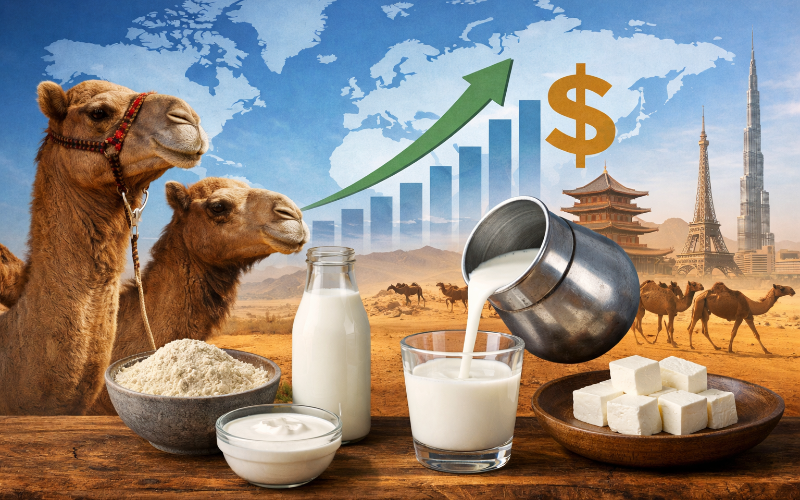Deliveries of agricultural products by rail to China from Kazakhstan in 2023 increased to a record 2 million 226 thousand tons

Several factors helped to achieve record shipment figures: an increase in deliveries via grain trucks, covered wagons and container trains; resumption of shipment of agricultural products fr om Kazakhstan to China by grain carriers. In less than a year, more than 0.5 million tons of cargo were shipped in this way.
In total, Kazakhstan exported 9 million tons of grain in 2023, compared to 8 million tons in 2022. Plus, flour exports turned out to be similar to last year - 2.2 million tons. Uzbekistan remained the main buyer, which purchased 4.5 million tons of wheat and flour in grain equivalent.
However, in general, the structure of Kazakhstan's exports became healthier last season. In 2022, there was essentially only one buyer left in the agricultural crops market in Kazakhstan - Central Asia. There were no export opportunities to China due to ongoing quarantine restrictions, and Iran had difficulty making payments due to sanctions. This led to market distortion and price imbalance. In 2023, China returned to the number of buyers, and this significantly improved the situation in agricultural trade.
“The opportunity for diversification of supplies to foreign markets is important for Kazakhstan,” noted Evgeniy Karabanov, official representative-expert of the Grain Union of Kazakhstan. “If there is only one sales direction left, then the buyer gets the opportunity to dictate their prices and conditions to us. Plus, additional unnecessary competition arises within the country between suppliers. That is, someone may make an unreasonable price reduction in order to sell their product faster. And we constantly saw all this in 2022. Now there are also such facts, but there are fewer of them, since an additional sales market has appeared - China. And this a solvent market, there are never any problems with payment for Chinese supplies."
In 2023, China imported 12 million tons of wheat. Of these, Kazakhstan supplied only 400 thousand tons. China purchased 11 million tons of barley on foreign markets during the year, including only 600 thousand tons in Kazakhstan.
“Our country’s share in the Chinese market should be much larger,” Evgeniy Karabanov is sure. “For barley, China is now the main market for us. If previously we sold our barley mainly to Iran, now our export opportunities there have decreased. So "And for wheat, we could increase the share to at least 10% of their imports. That is, up to 1-1.5 million tons per year."
Experts say that the infrastructure capabilities of the two checkpoints at the Dostyk-Alashankou and Altynkol-Khorgos railway junctions make it possible to increase the volume of supplies and reach a new record in 2024. Long-term prospects are even better, because the second main line to Dostyk is currently under construction, which will significantly increase the volume of supplies. It is planned that it will be introduced within the next two to three years. But for now there is an opportunity to increase exports to China both by increasing the number of trains and by optimizing the shipment scheme.
In particular, it is possible to increase the number of dispatched grain trains, which, with the same number of cars, have a more than twofold advantage in volume compared to container trains.
At the end of this year, 1.6 million tons of cargo passed through Dostyk - Alashankou, and only 623 thousand tons through Altynkol - Khorgos. The potential for increasing supplies through Khorgos is twofold. In general, experts say that with the current infrastructure, China can receive up to 5 million tons of agricultural products from Kazakhstan through two junctions.
The importance of supplies to China was also emphasized by the results of the harvest in Kazakhstan in 2023. Due to rainy weather in September, farmers received a huge amount of sprouted grain, 4-5 million tons, according to various estimates. Only China, wh ere there are technological capabilities for its deep processing, was ready to buy such wheat at an affordable price. If you do not ship sprouted grain promptly, then you can basically lose it, since not all farmers have dried it to the recommended 12-12.5% humidity. This means that germination processes can continue in warehouses.
There is demand from Chinese buyers, but various administrative barriers on the Chinese side are preventing an increase in supply volumes. This requires constant direct contact between government agencies of Kazakhstan and China to maintain export volumes at a high level.
“We desperately need China this year,” said Evgeny Karabanov. “We need to learn how to work with their government agencies. The principle there is that you need to constantly be in contact with them, otherwise they will not work, because they are bureaucratic and slow. These are the costs of government regulation. Therefore, they need to be constantly “pushed apart.” As soon as we weaken this contact, problems begin with receiving cargo on their side.”
It is important for Kazakh farmers that rhythmic shipments of agricultural products to China make it possible to maintain prices within the country at a fair level.
It is noted that the price per ton of milling wheat on the domestic market of Kazakhstan is now 110 thousand tenge (including VAT). This is a grain with a high falling number and gluten at 25%. Sprouted wheat with a germination share of up to 50% is sold at approximately 45-47 thousand tenge per ton. There are now about 2 million tons of such grain in the country.












